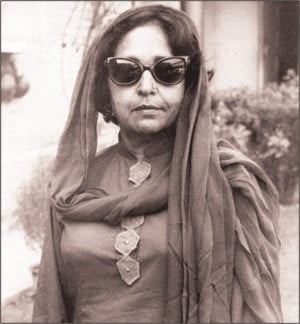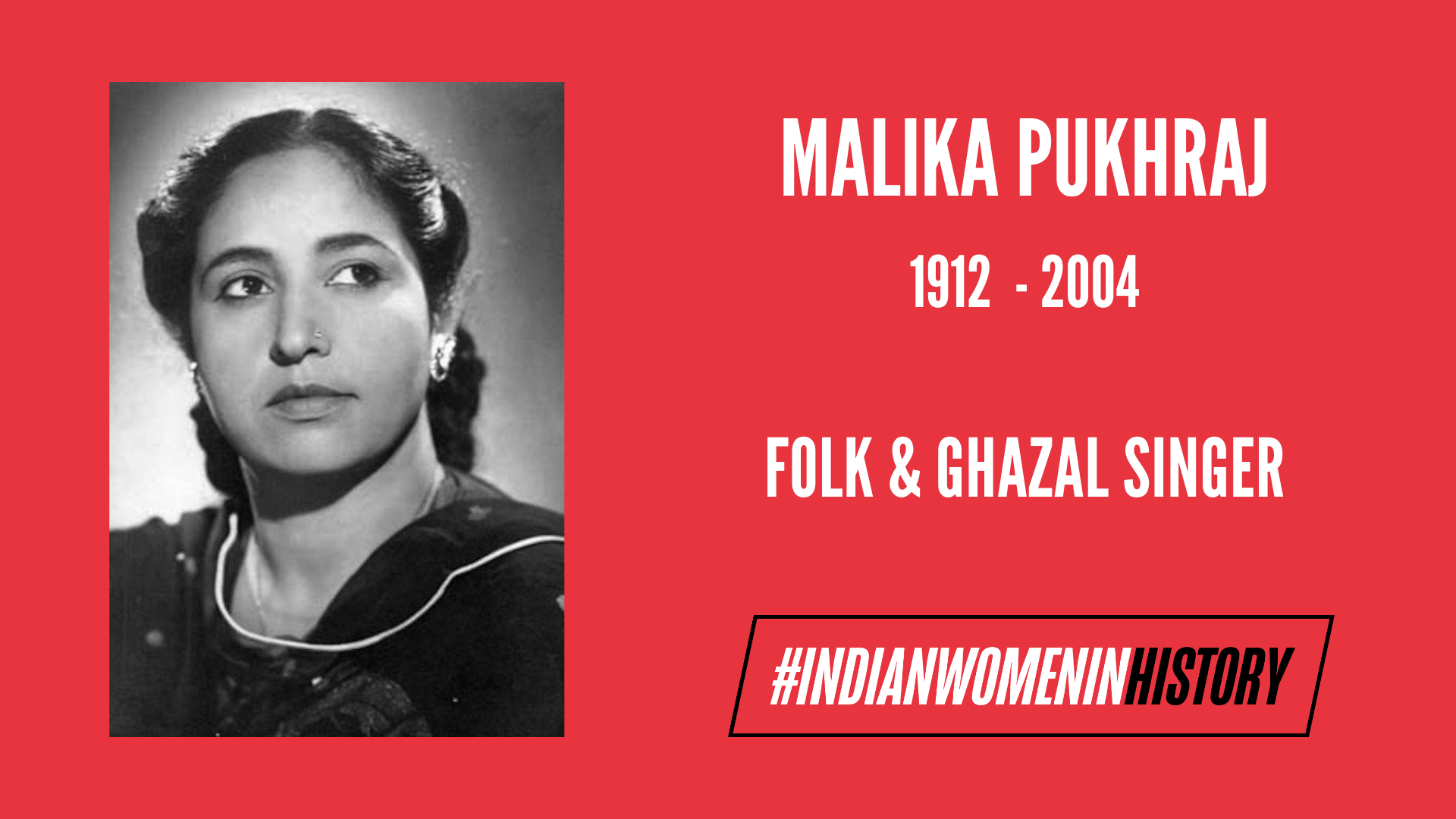Malika Pukhraj, a distinguished name etched in the cultural tapestry of India, emerged as a prominent figure during the mid-20th century. Born on May 4, 1912, in Mirpur, British India, she navigated through an era marked by societal transformations and political upheavals.
Malika Pukhraj’s life unfolded against the backdrop of pre-partition India, a time characterised by a quest for independence and a rich cultural milieu. Her significance in this period lies not only in her mesmerising contributions to music but also in her ability to capture the ethos of her time through her art.
As a renowned classical vocalist and songwriter, Malika Pukhraj’s achievements are woven into the very fabric of Indian music. Her soul-stirring renditions and poetic compositions not only earned her acclaim but also made her a cultural icon. This glimpse into her life sets the stage for a deeper exploration of the remarkable journey of Malika Pukhraj.
The formative years of Malika Pukhraj
Born on March 4, 1912, in Hamirpur Sidhar, Malika Pukhraj emerged from a lineage steeped in the artistry of professional musicians. Bestowed with the name “Malika,” by Baba Roti Ram ‘Majzoob,’ and “Pukhraj,” (Yellow Sapphire) by her aunt, herself a skilled singer-dancer, her identity was imbued with spiritual and artistic significance.

Growing up in an environment saturated with musical traditions, Malika faced societal norms that confined women to predefined roles. Undeterred, she defied these conventions, delving into the male-dominated sphere of classical music. Her early years were a testament to resilience and determination in the face of societal expectations.
Malika’s formal musical training commenced under Ustad Ali Baksh Kasuri, mentor to the legendary Ustad Bade Ghulam Ali Khan. This apprenticeship not only refined her artistry but also positioned her as a trailblazer in a changing cultural landscape.
In the crucible of tradition and modernity, Malika Pukhraj’s early life unfolded, laying the groundwork for a musical journey that would echo through the corridors of time
Melodic odyssey of Malika Pukhraj
Malika Pukhraj’s journey in the realm of music is a symphony of unparalleled depth and resonance. Her musical career, spanning several decades, stands as a testament to her unique contributions to the industry.
Malika’s musical prowess traversed the boundaries between classical and folk genres, a feat that distinguished her in an era dominated by rigid musical conventions. Her ability to infuse emotion into every note endeared her to audiences, making her a revered figure in the music landscape.
The songstress, known for her versatile voice, left an indelible mark with her ghazals, including timeless classics such as “Abhi To Main Jawan Hoon,” “Mare Qatil Mare Dildar Mere Paas Raho,” “Lo Phir Basant Aaye,” and “Piya Baaj Piyala Piya Jaye Na.” Each composition bore the hallmark of excellence, showcasing the richness of her vocal prowess.
Malika’s musical prowess traversed the boundaries between classical and folk genres, a feat that distinguished her in an era dominated by rigid musical conventions. Her ability to infuse emotion into every note endeared her to audiences, making her a revered figure in the music landscape.
A notable highlight in her illustrious career came in 1977 when the Indian government, recognising her pre-partition contributions at All India Radio, conferred upon her the prestigious Legend of Voice Award. This gesture underscored the cross-border appreciation for her exceptional artistry.
The accolades continued to pour in, and in 1980, the government of Pakistan honoured Malika Pukhraj with the Pride of Performance Award, a fitting tribute to her invaluable contributions.
Malika Pukhraj’s career not only elevated her to legendary status but also enriched the cultural tapestry of her time. Her melodic legacy remains etched in the annals of music history, an enduring testament to her unparalleled artistry.
Pukhraj in social and political milieu
Malika Pukhraj’s musical journey unfolded against the backdrop of a dynamic social and political landscape, where her contributions resonated with the spirit of her times.

In the mid-20th century, societal norms placed constraints on women, especially those venturing into the public sphere. Malika, born into a family of professional musicians, navigated this restrictive milieu with determination. The prevailing norms dictated specific roles for women, yet she defied these conventions, carving a niche for herself in the world of music.
Challenges echoed not only from societal expectations but also from the political upheavals of the era. The partition of India in 1947 brought forth a tumultuous period, disrupting lives and livelihoods. As an artist who straddled both pre- and post-Partition eras, Malika Pukhraj experienced the transformative impact of political events on cultural expression.
Her artistry became a means of addressing and transcending societal norms. Through the emotive power of her voice, she challenged stereotypes, paving the way for other women in the realm of music. Malika’s resilience in pursuing her passion amid societal challenges left an indelible mark, inspiring a generation to question and reshape established norms.
While her musical contributions were paramount, Malika Pukhraj’s unspoken dialogue with societal expectations and political changes set her apart as a trailblazer. In navigating the intricacies of her time, she not only embraced her role as a musical luminary but also unwittingly became a symbol of resilience and change in the face of societal and political constraints.
Unveiling the layers of Malika Pukhraj’s journey
Malika Pukhraj’s life and contributions, though celebrated, invite nuanced scrutiny. While her musical prowess is undeniable, the societal and gender dynamics of her time cast shadows on her journey. The very appreciation for her voice sometimes inadvertently reinforces the notion that women must conform to established norms of beauty and grace, overshadowing the depth of her artistry.
Her association with certain political figures sparked debates, but she skillfully navigated these turbulent waters. The delicate balance between artistic expression and political affiliations underscored the challenges artists faced during times of socio-political flux.
Controversies, though minimal, shadowed Malika’s career. Her association with certain political figures sparked debates, but she skillfully navigated these turbulent waters. The delicate balance between artistic expression and political affiliations underscored the challenges artists faced during times of socio-political flux.
Malika’s work unfolded against a canvas painted with societal shifts and political tremors. The raw emotion in her ghazals and the defiance in her voice mirrored the spirit of an era marked by struggle and transformation. Her art both mirrored and influenced the socio-political climate, offering solace to a nation grappling with its identity.
Malika Pukhraj’s legacy is a tapestry woven with threads of artistic brilliance, societal challenges, and political nuances. Her lasting impact lies not only in the melodies she gifted the world but also in the resilience she exhibited as a woman in a male-dominated industry. As we delve into the layers of her life, we unearth not just a musician but a cultural icon who, through her art, contributed to broader conversations about women’s roles, cultural identity, and the interplay between art and politics. Malika Pukhraj, in essence, transcended mere musicality; she became a cultural prism refracting the complexities of her time.
References:
- Remembering Malika Pukhraj
- Her Highness, Malika Pukhraj
- VIDEO OF MALIKA PUKHRAJ
- Who can forget Malika Pukhraj’s ‘Abhi toh main jawaan hoon’?
About the author(s)
Maria Mabood is a 24-year-old graduate with both Bachelor's and Master's degrees in Economics from Jamia Millia Islamia. She is an aspiring researcher, passionate about delving into the intricacies of economic theory.
Her enthusiasm lies in both writing and research, where she aims to combine her academic knowledge with creative expression. She is eager to contribute valuable insights to diverse topics and explore new horizons through collaborative efforts.





